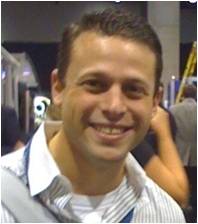Abstract:
Shared Knowledge and Information Flow in Systems Engineering:
Socio-Cognitive Analysis of the GSFC Mission Design Laboratory
Poster Session (ppt 1 MB) |
In the past decade, GSFC has been implementing an innovative approach to space
systems design. The Mission Design Laboratory (MDL) increases the pace of
conceptual design by bringing together all relevant personnel in the same room
to conduct focused, collaborative one-week design sessions. Since its
inception, the MDL has completed over 250 design studies on a variety of
mission concepts.
This research presents an analysis of the MDL process from both a technical and
a social perspective. The work is divided into three parts. The first part
analyzes technical information flow in a typical MDL study using a matrix-based
representation of parameter dependencies. This systems-level process model
reveals the phases of the design life cycle, the interdisciplinary design
trades, clusters of interdependent disciplines, and the starting assumptions
that can be made to optimize the process. The second part draws on the insights
of organizational and social psychology to analyze shared knowledge in the
design team. Using survey data on team members' perceptions of the major
design drivers in 12 MDL sessions, a model of shared knowledge in the team is
constructed. A statistically significant correlation is then demonstrated
between change in shared knowledge over time and various technical attributes
of the system, including mission concept maturity, development time, launch
mass, and system cost.
The third and final part of the research offers a socio-technical analysis of
the MDL process that integrates technical information flow and team dynamics.
This analysis suggests that shared knowledge could be a mediating variable that
helps to translate team interactions into the final product of the design. In
addition, the integrative analysis shows that the design of the Communications
subsystem serves a central role both in the overall design process and in the
dynamics of the team. Based on the findings of all three parts of the
research, a standardized model of the MDL design process is proposed. Finally,
the research offers some implications for the future of the MDL and discusses
the applicability of the proposed model to systems engineering in full-scale
NASA development programs.
Biography:
 Mark S. Avnet
is currently completing his Ph.D. in Engineering Systems at
the Massachusetts Institute of Technology. He holds an S.B. in
Physics with a minor in Spanish from MIT and an M.A. in Science,
Technology, and Public Policy from The George Washington
University. Mark received a Graduate Certificate in Applied
Science, Space Studies from the University of South Australia
for completion of the International Space University's Summer
Session Program.
Mark S. Avnet
is currently completing his Ph.D. in Engineering Systems at
the Massachusetts Institute of Technology. He holds an S.B. in
Physics with a minor in Spanish from MIT and an M.A. in Science,
Technology, and Public Policy from The George Washington
University. Mark received a Graduate Certificate in Applied
Science, Space Studies from the University of South Australia
for completion of the International Space University's Summer
Session Program.
Prior to returning to MIT to pursue his Ph.D., Mark worked
as a Program Specialist for Centennial Challenges at NASA
Headquarters. Mark has served as a Research Assistant at The
George Washington University's Space Policy Institute and as
a visiting researcher at NASA Ames Research Center. In
addition, he spent two years working as a software developer
for Rocket Software, Inc. in Newton, MA.
 Mark S. Avnet
is currently completing his Ph.D. in Engineering Systems at
the Massachusetts Institute of Technology. He holds an S.B. in
Physics with a minor in Spanish from MIT and an M.A. in Science,
Technology, and Public Policy from The George Washington
University. Mark received a Graduate Certificate in Applied
Science, Space Studies from the University of South Australia
for completion of the International Space University's Summer
Session Program.
Mark S. Avnet
is currently completing his Ph.D. in Engineering Systems at
the Massachusetts Institute of Technology. He holds an S.B. in
Physics with a minor in Spanish from MIT and an M.A. in Science,
Technology, and Public Policy from The George Washington
University. Mark received a Graduate Certificate in Applied
Science, Space Studies from the University of South Australia
for completion of the International Space University's Summer
Session Program.